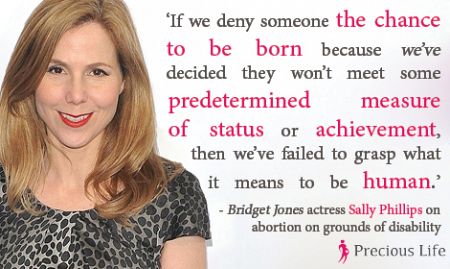Bridget Jones star in new BBC documentary 'A World Without Down's Syndrome?'
Sally Phillips, whose twelve-year-old son, Ollie, was diagnosed with Down's Syndrome when he was ten days old, explores the ethics of screening tests for the condition in a new documentary on BBC2 on Wednesday 5th October at 9pm. Watch on the BBC iPlayer now.
At a time when many celebrities and other notable people are coming out of the woodwork to 'boast' their support for abortion, Bridget Jones actress Sally Phillips is campaigning from a different angle.
Twelve years ago, Sally's first child, Ollie, was born in London and soon after diagnosed with Down’s syndrome. The Daily Mail reports about her reaction to the news:
"Speaking about the moment she was told by the doctor, she said: 'I hyperventilated and flapped my arms.'
"The 46-year-old said she was warned by doctors that Ollie may never walk or talk.
"But now her son is able to recite poetry, run, swim and ride a bike - and he even boasts an exceptional sense of humour and dance ability.
"'Once we got over the initial shock, we just got on with it. It was never going to be easy, but we never moaned about the hard times,' she had previously said."
In another interview in 2012 with the Daily Mail, she talks even more about Ollie:
“‘I had a vision of sitting writing my screenplay with my baby in a Moses basket by my side.’ She laughs. ‘That would have been naive even if things hadn’t been more complicated.’ As it turned out, things – as they often do – turned out to be quite complicated indeed. When he was ten days old, Ollie was diagnosed with Down’s syndrome. He was in and out of hospital almost constantly for the first year of his life. Sally’s life, meanwhile, had been turned upside down, and writing her first screenplay suddenly slipped down the priority list. ‘I think parenthood does that anyway, but there is no doubt that my experience was more intense. [...]
“‘What having a Down’s syndrome child isn’t – and I feel very strongly about this – is a tragedy. All those pregnancy books you read when you are expecting refer to Down’s syndrome as if it were the worst possible outcome, and it’s not. I mean it really is so far from the worst possible outcome. My son is lovely. He’s in mainstream school and parents of other children in his class say they are so glad he’s in the class. He’s very popular and he can talk and read and walk and do maths and play computer games and all of those things. In fact, he’s better at the computer than I am.
“‘We were told we had a 1 in 10,000-odd chance, and he wasn’t diagnosed immediately, so I was sort of very angry for a while. It took me a while to work the steps backwards, and when I asked myself, “So would you have terminated?” the answer was no.
“‘They are always questions that are a step away from, “Would you prefer not to have had your child? Would you prefer it if he never existed?” No! I’m very glad my child has been born, thank you very much. I think he’s lovely.
“‘My blood runs cold when I hear the “great news” that we have found a marker for the Down’s syndrome gene, which means we can identify it more easily. Why is that good news? It’s only good news if you’re going to terminate. Hurrah, we can kill more! That makes you want to vomit when you’re a parent.’”
When filming a documentary for BBC2 about Down's syndrome and the ethics of pregnancy screening, Phillips was 'horrified' when talking to other mothers who have babies with the condition.
'I have heard many stories of women being pressurised by medical professionals to screen, and even to terminate.'
A medic said to one of the mothers after the diagnosis: 'Let's stop this nonsense now while you still can'. Another medic had actually booked an abortion for the mother without her consent.
One mother was told: 'Your marriage will break-up if you have this baby.'
All these testimonies expose the pressure put on women to have abortions when their unborn babies have been diagnosed with a disability of any kind! When you consider that we have just celebrated the Paralympics in Rio 2016, it is hypocrisy that so much time and money be spent trying to eliminate these special babies.
Sally speaks well when she says:
'If we deny someone the chance to be born because we've decided they won't meet some predetermined measure of status or achievement, then we've failed to grasp what it means to be human.'
Watch Sally Phillips in 'A World Without Down's Syndrome' on the BBC iPlayer


